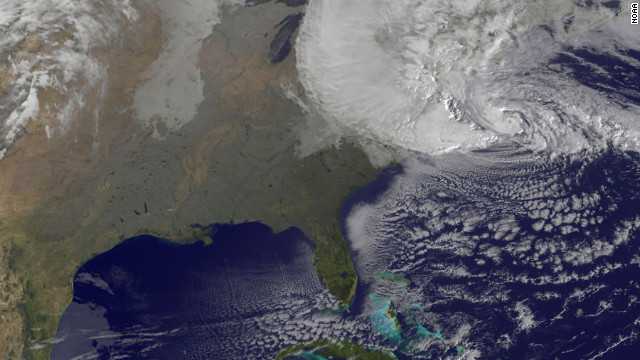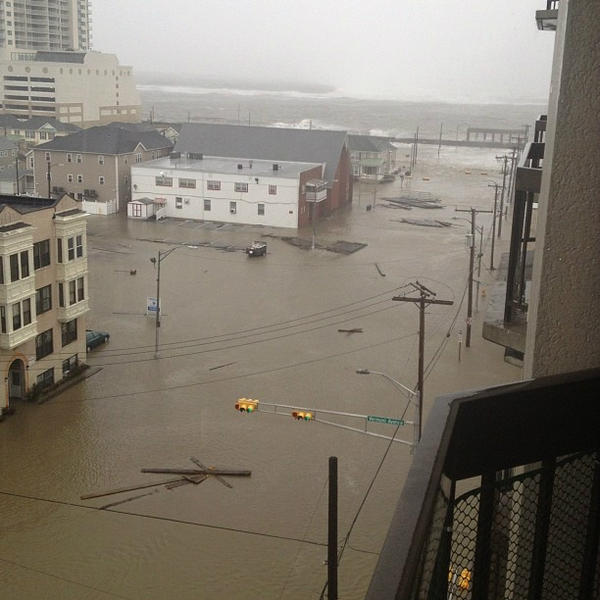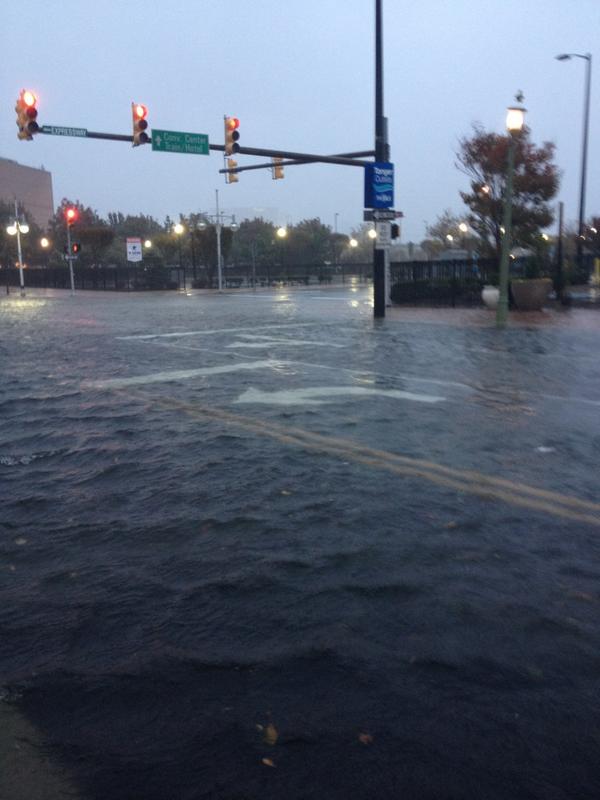M WAQAR..... "A man's ethical behavior should be based effectually on sympathy, education, and social ties; no religious basis is necessary.Man would indeed be in a poor way if he had to be restrained by fear of punishment and hope of reward after death." --Albert Einstein !!! NEWS,ARTICLES,EDITORIALS,MUSIC... Ze chi pe mayeen yum da agha pukhtunistan de.....(Liberal,Progressive,Secular World.)''Secularism is not against religion; it is the message of humanity.'' تل ده وی پثتونستآن
Monday, October 29, 2012
Flooding rescues under way as Sandy threatens 'catastrophe' of a lifetime
People stranded in flooding after ignoring evacuation orders were being saved Monday morning as Hurricane Sandy took aim at the Mid-Atlantic coast, bringing some of the nation's busiest cities to a standstill.
Dramatic rescue efforts were under way in Oak Orchard, Delaware, a community along the Indian River Bay and a part of the state that was under a mandatory evacuation over the weekend. Officials across the Eastern Seaboard had implored residents to obey evacuation orders, emphasizing that local authorities could be put in danger if they tried to save them.
New Jersey Gov. Chris Christie put it most bluntly: "Don't be stupid. Get out!"
Still, some didn't leave. Delaware Gov. Jack Markell said the National Guard and local fire and police officials were rescuing people in his state early Monday.
It's just one of the scenes that make Sandy seem straight out of a disaster blockbuster: A killer storm takes aim at one of the most populated regions of the country."This is the most catastrophic event that we have faced and been able to plan for in any of our lifetimes," Connecticut Gov. Dan Malloy warned.
An expected storm surge at midnight could raise water levels to 11 feet above normal high tide, bringing "the potential to cause unprecedented damage."
Mass transit grinds to a halt
Along the Eastern Seaboard, hundreds of thousands of people have been forced from their homes. New York City landmarks are eerily empty. The nation's capital is emptied of government workers. Much of the region was settling into paralysis, bracing for what's to come.
From North Carolina to Maine, forecasters warned that Sandy was likely to collide with a cold front and spawn a "superstorm" that could generate flash floods, snowstorms and massive power outages.
About 50 million people, from Virginia to Massachusetts, are expected to feel the effects of Sandy.
"It could be bad," said U.S. Coast Guard Rear Adm. Steven Rattior, "or it could be devastation."
And the impact isn't limited to the East Coast. Wave heights in Lake Michigan could reach 28 feet Monday night and 31 feet by Tuesday, the National Weather Service said.Sandy already proved its deadly wrath, claiming at least 67 lives, 51 in Haiti alone, as it smashed through the Caribbean last week.
Federal, state, and local U.S. officials have been working hard to bang out the message that Sandy is dangerous.
Newark Mayor Cory Booker told CNN early Monday: "My biggest concern is just people not taking it seriously and not taking the proper precautions. We still have some time for people to get ready. ... We anticipate there could be many days without power afterward."At 8 a.m., Sandy, a Category 1 hurricane, was 265 miles southeast of Atlantic City, New Jersey, and about 310 miles south-southeast of New York City, the center said. Maximum sustained winds were at 85 mph, and Sandy was moving north-northwest at about 20 mph.
Hurricane-force winds extended outward 175 miles from the center, and tropical storm-force winds reached 485 miles.
The center is expected to reach the coast Monday evening and make landfall between 8 p.m. and 2 a.m. on the Delmarva Peninsula -- an area occupied by parts of Delaware, Maryland and Virginia -- or Jersey Shore.
By the time it reaches the coast, Sandy may not officially be a hurricane, but its widespread effects will be the same either way, CNN meteorologist Dave Hennen warns.
But even with the storm hundreds of miles offshore, officials were warning of Sandy's life-threatening, storm-surge flooding portions of the Mid-Atlantic, including low-lying areas of New York and New Jersey.Michelle Franchaise of Ocean Gate was among the tens of thousands in New Jersey ordered to leave their coastal communities Sunday.
She and more than 180 others hunkered down at an emergency shelter in Toms River, New Jersey, to ride out the storm. She selected one of the 250 green cots that lined the floor.
"I'm very concerned when I see the map, and I see how big it is," she said. "I think I'm in good hands here. I think I'm safe."
At least 60 people at the Toms River shelter brought their pets.
"The cops came around and were like, 'If you don't leave, you're going to be arrested,' " one woman said while cradling one of four kittens she brought with her. "I couldn't leave without them."By early Monday, the city that never sleeps bedded down after shuttering its bus and train lines, closing schools and ordering about 400,000 people out of their homes in low-lying Manhattan and elsewhere.
The process of halting subway service in New York began Sunday night. Other mass transit systems are doing the same by suspending their services Monday, including Washington's Metro service and Southeastern Pennsylvania Transportation Authority trains and buses in and around Philadelphia.In Sea Bright, New Jersey, Yvette Cafaro scrawled a plea on the plywood that covered up her burger restaurant: "Be kind to us Sandy."
The seaside area largely dodged last year's Hurricane Irene, and Cafaro is hoping for, but not expecting, another reprieve.
"Everything that we've been watching on the news looks like this one will really get us," she said. "We're definitely worried about it. ... Hopefully, she'll spare us."
After filling his trunk with sandbags Sunday in Cranston, Rhode Island, resident Steve Pacheco said he had done what he could by clearing Halloween decorations and other items from his yard. Still, for all his preparation, he admitted that Sandy made him nervous.
"I don't want to go through this again," Pacheco told CNN affiliate WPRI-TV in Providence.
The price tag for potential wind damage alone is estimated between $2.5 billion and $3 billion, according to the Federal Emergency Management Agency.
The estimate doesn't take into account potential flooding and other damage, though the federal government pre-emptively declared states of emergency in a number of locales to help states cope with Sandy and its aftermath.Officials have canceled classes Monday for more than 2 million public school students in districts such as New York, Philadelphia, Boston and Baltimore, while numerous universities as well as federal government offices in Washington and government offices in states like New Jersey were closed.
The U.S. stock exchanges will be closed Monday and possibly Tuesday, announcements that followed soon after New York declared a state of emergency Sunday.
The last time the New York Stock Exchange closed for a weather event was in 1985, during Hurricane Gloria. And in 1969, a snowstorm also brought the exchange to a halt.
Sandy has even managed to put the presidential election on the back burner, turning campaign plans upside down.
Politicos from both sides said it is still too early to tell what effect the storm will have on the presidential race, though the access to voting centers will be a concern if the storm persists until Election Day.
"I don't think anybody really knows," top Obama adviser David Axelrod said on CNN's "State of the Union."
"Obviously, we want unfettered access to the polls because we believe that the more people come out, the better we're going to do, and so to the extent that it makes it harder, you know, that's a source of concern. But I don't know how all the politics will sort out."
Virginia's Republican governor said Sunday that his state would take measures to ensure residents are able to vote despite obstacles the storm might bring.Then there are the travel nightmares that the storm has and will continue to cause -- with thousands of flights called off, Amtrak train runs scuttled and hundreds of roads and highways expected to flood.
"This is not a typical storm. It could very well be historic in nature and in scope and in magnitude because of the widespread anticipated power outages, flooding and potential major wind damage," Pennsylvania Gov. Tom Corbett said, speaking of his state but just as well about many others in the Mid-Atlantic and Northeast.
"Essentially, this is a hurricane wrapped in a nor'easter."Janie Lambert of Hughesville, Maryland, stopped for a look Sunday at the beach at the Pax River Naval Station along the Chesapeake Bay.
The typically calm surf churned violently, pushed by winds so powerful that it nearly knocked her off her feet when she got out of her car to videotape it.
"We made it safely home," she said. "But I know this is only the beginning of several scary days ahead."




No comments:
Post a Comment